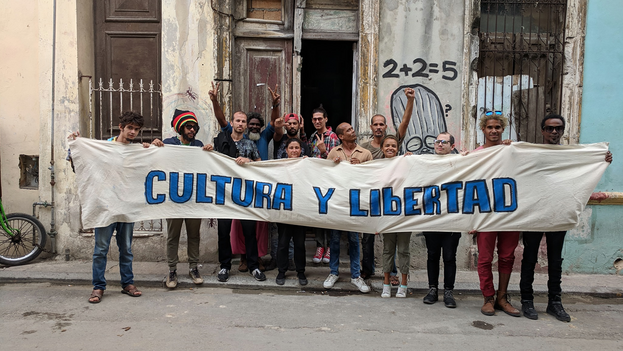
![]() 14ymedio, Luz Escobar, Havana, 12 March 2021 — The San Isidro Movement (MSI) explained during a press conference details about the National Dialogue initiative proposed by the Patria y Vida [Homeland and Life] platform, inspired by the song by Yotuel Romero, Gente de Zona, Descemer Bueno, Osorbo and El Funky.
14ymedio, Luz Escobar, Havana, 12 March 2021 — The San Isidro Movement (MSI) explained during a press conference details about the National Dialogue initiative proposed by the Patria y Vida [Homeland and Life] platform, inspired by the song by Yotuel Romero, Gente de Zona, Descemer Bueno, Osorbo and El Funky.
Iris Ruiz, Michel Matos, Amaury Pacheco and Luis Manuel Otero Alcántara participated in the press conference, responding to the question of what they understand as dialogue “in the context of hostility” experienced on the island from the “Cuban dictatorial regime.”
All agreed to call for the exchange but at no time did they point to “the Government” as the main interlocutor. Asked about it by this newspaper, the artists expressed their opinions.
Michel Matos said that “understanding that Cuba is a sore nation with deep scars” he agrees that “a civilized and logical way to carry out a restoration is to dialogue among ourselves.”
“The other alternative that remains to get out of such a terrible situation is one that we cannot allow nor are we qualified to do, which is basically war,” he added. Matos explained that to reach democracy, very diverse processes must be gone through. “I have heard expressions like ‘pack your bags and go’ directed towards the communists and I ask if this is realistic,” he said.
“How do we expect them to leave? By magic, by their own will, by the intervention of a foreign government, how is that going to happen?” he asked. “In the references that I have in historical terms, each time a dictatorship has ended, it has been under the parameters of agreements, negotiations, road map protocols and an agenda for dialogue where an understanding is reached on a key point that it implies the transition,” he said.
At another point, Matos was more decisive when he said: “I don’t see any other way to transition to a democratic rule of law other than by dialoguing at some point with the current Cuban totalitarian authorities, I can’t conceive of it, we have to be open to the idea of that there can be such a dialogue.”
Matos also mentioned the November 27 demonstration in front of the Ministry of Culture and recalled that on that day “the majority” asked to dialogue with the Cuban authorities. “When that meeting was held, the specific words were said, they spoke of State crime, repression, totalitarianism, kidnapping of the country by State Security, that was mentioned in the framework of a dialogue.”
For his part, Amaury Pacheco said that dialogue “is important” because “it allows us to go from the complaint to the demand, from the demand to the proposal, from the proposal to a program, to a route, to a strategic action.” For the poet “dialogue is conscience, it is freedom, it is restoration, transparency, it is to maintain the character of a position in front of the regime.”
“I think this is a step that has demonstrated the incapacity of the regime. As civil society we have put dialogue on the table and the Government has backed down. This exchange is needed to have a program of how we are going to move because the Communist Party is not going to pack its suitcases and leave. We must plant conscious programs and let the citizens know them, “reflected Pacheco.
For Otero Alcántara there is an extreme radical, which is the Government, “which does not want to dialogue.” As for the “other extreme”, which is also opposed to this process, the artist says that it will be heard. “We know there is a lot of pain,” he declares, while hoping that “the tendency is not to rip off the heads of the communists.” “We have to learn that we all own the word dialogue” because “the national dialogue is happening,” he said.
At another point in the press conference, the members of the MSI referred to the talks on Human Rights that the Cuban government has with the European Union. In this regard, Matos stated: “If Europe is in dialogue with the Government, the island’s civil society must be recognized and be part of that process. Our names must be pronounced at those tables because we are the ones who are constantly suffering the violations of human rights, and we need to be recognized as valid interlocutors.”
Otero Alcántara firmly believes that “change in the country will come from the Cubans” but it should be accompanied “by international factors that are important” and can “form part of that dialogue.”
And he demanded, “the regime does not know what to do with those of us who are pacifists but we have the support of citizens, Europeans have to recognize us as civil society.”
____________
COLLABORATE WITH OUR WORK: The 14ymedio team is committed to practicing serious journalism that reflects Cuba’s reality in all its depth. Thank you for joining us on this long journey. We invite you to continue supporting us by becoming a member of 14ymedio now. Together we can continue transforming journalism in Cuba.
